Que fait l'amplificateur pour l'audio de la voiture ?
Si vous êtes un passionné d'autoradio, vous savez probablement tout sur les amplificateurs. Mais ceux qui ne connaissent pas grand-chose à l'audio automobile pourraient se demander :à quoi sert un amplificateur ?
Eh bien, essentiellement, un amplificateur prend le signal audio de votre chaîne stéréo et le rend plus fort. C'est si simple! Cependant, il y a un peu plus que cela.
Un amplificateur amplifie le signal audio de bas niveau généré par l'unité principale afin qu'il soit suffisamment puissant pour déplacer les cônes des haut-parleurs et créer du son. Cependant, le signal doit d'abord être traité et nettoyé par un préamplificateur pour améliorer la qualité sonore lors de l'amplification.
Dans l'article ci-dessous, je discuterai plus en détail des différents types d'amplificateurs de voiture et de la manière de les connecter correctement à l'autoradio.
Que fait un amplificateur dans une voiture ?
Un amplificateur est un composant crucial de tout système audio de voiture. Il prend le signal de bas niveau de votre chaîne stéréo et l'amplifie afin que vos haut-parleurs puissent créer des sons beaucoup plus forts que lorsqu'ils sont alimentés par un autoradio.
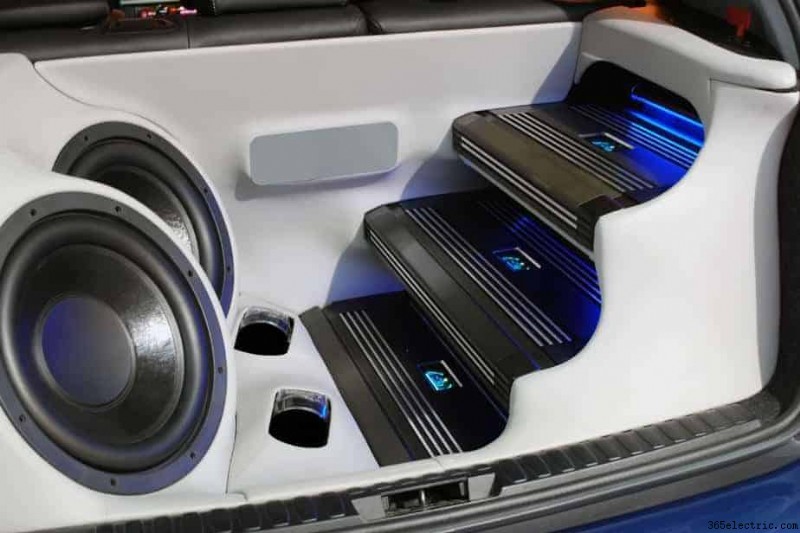
L'amplificateur vous permet d'avoir une excellente expérience audio de voiture. Sans amplificateur, la musique semblerait plate et sans vie. La musique prend vie avec un amplificateur, et vous pouvez ressentir des graves et des aigus plus forts.
Tout cela est dû au fait que les haut-parleurs reçoivent de l'amplificateur une tension plus élevée que celle de la stéréo.
Comment fonctionne un amplificateur audio de voiture ?
Un amplificateur prend le signal de bas niveau de votre chaîne stéréo et l'amplifie afin que les haut-parleurs puissent créer du son. Pour ce faire, il prend le courant électrique de la batterie de votre voiture et l'utilise pour créer un champ magnétique.
Ce champ magnétique est ce qui entraîne les cônes des haut-parleurs et crée le son. Plus le champ magnétique est fort, plus les mouvements du cône peuvent être grands et, par conséquent, plus le son est fort.
L'amplificateur possède également ce qu'on appelle un contrôle de gain. Le contrôle du gain, bien que souvent négligé, vous permet d'ajuster le degré d'amplification du signal.
Un réglage du gain est nécessaire pour obtenir les meilleurs résultats, y compris la qualité sonore, fournir aux haut-parleurs une puissance suffisante et éviter la distorsion par écrêtage.
Ces ajustements sont essentiels et doivent être définis individuellement dans chaque système audio car il n'y a pas de tension de sortie standard utilisée par les différents autoradios.
Avec le gain, cependant, il faut faire attention car si vous le montez trop haut, vous commencerez à entendre de la distorsion dans la musique.
Lorsque la distorsion commence, cela signifie que l'amplificateur pousse trop fort le cône du haut-parleur, ce qui déforme le son clair.
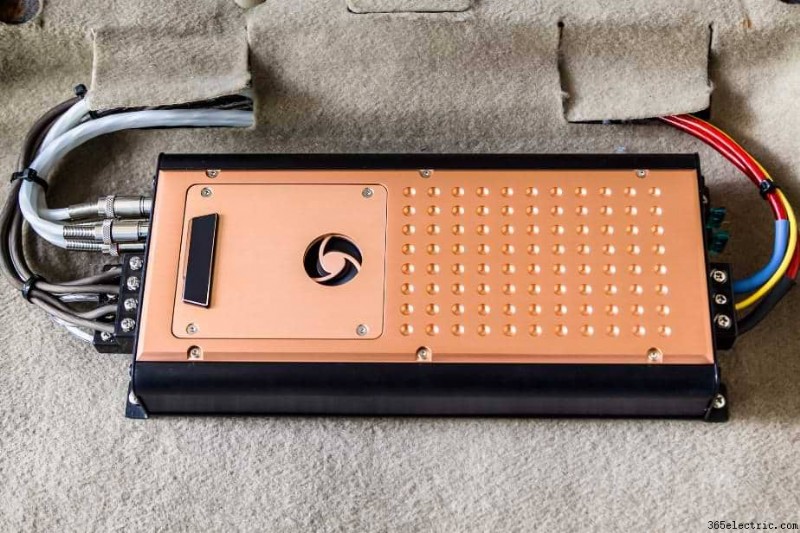
Un amplificateur de voiture améliore-t-il la qualité du son ?
Les amplificateurs de voiture améliorent la qualité du son, peu importe le modèle ou la marque dont il s'agit.
Un amplificateur prend le signal de bas niveau de votre chaîne stéréo et l'amplifie afin que vos haut-parleurs puissent créer des sons beaucoup plus forts, mais ce n'est pas tout.
Le processus d'amplification nettoie également le signal afin que la qualité du son s'améliore lorsqu'il est amplifié, ce qui donne des sons beaucoup plus pleins, plus riches et plus précis.
La musique aura plus de profondeur et de détails, et vous pourrez entendre des choses que vous ne pouviez pas entendre auparavant.
Il existe de nombreux types d'amplificateurs disponibles aujourd'hui, chacun avec son propre ensemble de caractéristiques et de fonctions :
Quels systèmes audio de voiture bénéficient d'un amplificateur
Every type of car audio system out there will benefit from an amplifier, making the music pouring through the speakers louder and crisper, with the ability for the system to jump levels quickly with no issue.
When you listen to your factory stereo, there is a certain decibel level at which the system maxes out. When you turn it up any further, the music becomes distorted and cracks, and the clarity is lost.
While the amplifier boosts the signal from the stereo, it is the output that benefits the most. The speakers and subwoofer are the main benefactors of the amplifier, so should you change them as well?
Replacing speakers allows you to upgrade sounds further and obtain the high-quality sound you want without replacing the original stereo.
Adding an amplifier can allow your speakers to truly come alive.
Amps sizes are categorized by the wattage supplied to each speaker. They range from 20W per channel on the low end to over a thousand on the high end.
Wattage around 100 to 200W per channel is the most common range and will add a nice boost and sound level to the audio system.
I found that the 100 watts per channel amp in A/B class in my car is more than needed, while my larger SUV required over 200W RMS per channel to crank up the sound throughout the vehicle.
A compact or mid-size car would do well with a 40W, while a larger sedan may require a 100W or bigger one. The number of speakers and the inside volume of the vehicle will determine the size you need.
Do Car Stereos Have Built-in Amps?
Car radios have small, built-in amplifiers as a power source for basic speakers, but they are not powerful enough to drive larger, aftermarket speakers. Also, car radios do not have the power to drive subwoofers, so an external amplifier is required.
However, even if the radio has an amplifier, its power is low and rarely exceeds 10W RMS per channel. So, as I already mentioned earlier, this is not enough to power even the mid-range speakers, let alone more demanding component systems.
Is An Amplifier The Same As A Pre-amp?
The amplifier and pre-amp are two different things, although often mixed up.
While they serve the same purpose:to magnify the system’s output, the pre-amp boosts the low-level signal to a higher level.
Then an amplifier takes the amplified signal from your pre-amp and strengthens it further so your speakers can create even louder sounds.
In essence, the pre-amp gets the weak audio signal high enough for the amplifier to take over and amplify it to the level needed for your speakers to create sound.
Typical pre-amps are built into the car stereos and have RCA outputs for RCA cables that connect to the amplifier.
Do I Need an Amplifier if I Am Getting New Speakers?
While you don’t need an amplifier if you are just replacing your car speakers with the same model, you may not be getting the most out of them in the end.
When it comes to the aftermarket speakers, which in the vast majority have higher power handling than factory speakers, they will require an external amplifier to reach their full potential.
I recommend using an amplifier for any speakers with an RMS greater than 40W per channel. This is because even the strongest aftermarket stereo does not have more than 18W RMS per channel, which is insufficient to make high-quality sounds.
A good amplifier will not only make your music sound better but will also make it louder.
How to Choose the Right Car Amplifier?
There are so many options for you to consider when boosting your car audio that you must first think about what you want to achieve.
The size and number of speakers in your car can help you decide what amplifier you need.
The more space in your car to fill up with the sound, the more watts you need from your amplifier. You may also want to consider what other parts of your car audio system you will upgrade if any.
A simple 4-channel amp will boost your audio enjoyment to all four of your speakers. If you have more than four speakers, 5 or 6-channel aftermarket amplifiers will give extra power to your subwoofer or other audio devices.
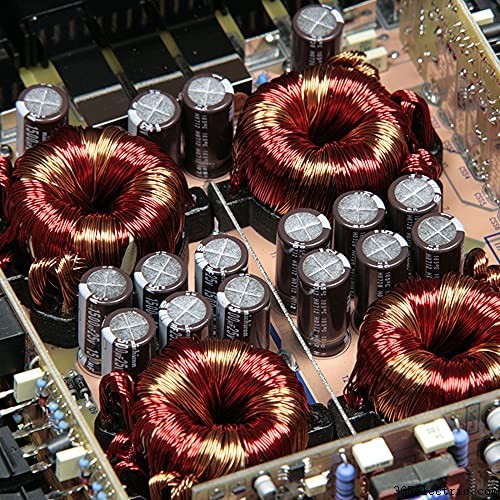
Once you decide what size and how many channels you need, then you can start looking at the different features that each amplifier offers.
If you are overhauling your entire audio system and want to add a lot of power, better speakers, and a bass-booming subwoofer, you may need to have one amplifier for the speakers and a separate mono amp just for the subwoofer.
The separate amplifier will be dedicated to the subwoofer and will not have any power sucked away for the speakers. This will give you the cleanest, most powerful bass response.
When looking at different amplifiers, you will want to compare them by their wattage output and how many channels they have. You should also consider what features each one offers and if they would benefit your car’s audio system.
Some features to look for are:
#5. Variable gain control
#6. Thermal protection circuits
#7. Low Pass Filter and High Pass Filter
#8. A DC-DC switching power supply
#9. Noise prevention (“ground loop”)
#10. Bridging circuitry
From all above, you can see that a car amplifier is a critical component in any car audio system, whether you are just replacing your speakers or want to create a custom sound system.
Without an amplifier, you will not be able to get the most out of your speakers and other audio devices.
What Size Amplifier Do I Need?
When choosing an amplifier, make sure to consider what size the amplifier is. The size of the amplifier you need will depend on how many watts of RMS your speakers are and what kind of audio system you have in your car.
If you only have a basic stereo with no subwoofer or other audio devices, you can get away with a smaller amplifier. But if you have multiple speakers and a subwoofer, you will need a bigger unit to give all your audio devices the power they need.
The size of your car can also play a role in what size amplifier you need. If you have a small car, you may not need as much power as someone with a large SUV or truck, but it is not always the case.
In general, the amplifier should be more powerful than the speakers otherwise, the sound quality will suffer, and if you connect it with the highly demanding speakers, it can even overheat and start clipping the signal.
Do All Cars Have an Amplifier?
Not all cars come with an amplifier. In fact, most cars today do not come with a factory-installed amplifier because the factory-installed systems offer a minimum basic unless your vehicle has installed expensive premium audio.
If you want to add an amplifier to your car audio system, you’ll need to purchase one separately and then wire it into your system.
Where Is the Amplifier in a Car?
The amplifier is usually located in the car’s trunk, but it can also be found under a seat or in the glove compartment, depending on its size and the system design.
While there are many options for adding the amplifier to your car, these days, there are so many compact amplifiers that they can easily slide under a seat or behind the front dash.
Larger, more complex systems require some ingenuity to place the amplifier in an inconspicuous area, though many opt to give up trunk space in favor of the amp and subwoofer.
There are DIY kits if you are handy with these types of installations, but many store chains and specialty businesses offer installation for a price.
However, regardless of where the amp is installed, you must place it in a solid position so it does not rattle or move around when the car is in motion.
How Much Does an Amplifier Cost?
The cost of an amplifier depends on many factors, as they come in so many sizes with so many different features.
Simple two-channel amps cost about $50, whereas a branded quality amp with 4 or more channels can go for upwards of $1,300.
As I previously mentioned, the amp’s cost largely depends on its power, class, built-in features, and brand.
If you are using all of your original stereo equipment, I recommend a smaller, less expensive four-channel amplifier.
But, if you want to overhaul your entire system and put some real oomph into your music, shoot for a larger, more expensive model that can handle all your speakers and subwoofer.
It does not mean you have to invest thousands of dollars into the audiophile class, but having a multichannel amplifier with a built-in simple sound processor will make the installation easier and more customizable.
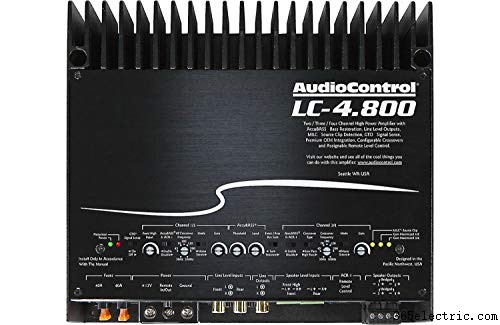
An excellent example worth considering is the Audio Control LC-4.800 , equipped with a separate Acubass control.
What Is the Most Expensive Car Amplifier?
There are many amplifiers worth thousands of dollars, but the most expensive ones I could find are the monoblock Sundown Salt 12 and a 4-channel Audison Thesis Quattro .
Sundown Salt 12 is a true monster with 12,000 W RMS at 1 ohm. This nearly 38″ monoblock that requires a 2,000 AMP fuse costs well over $4,000.
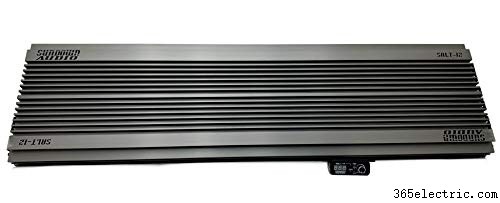
Audison Thesis Quattro , on the other hand, is an audiophile class amplifier for which you also need to spend close to 5.000 dollars.
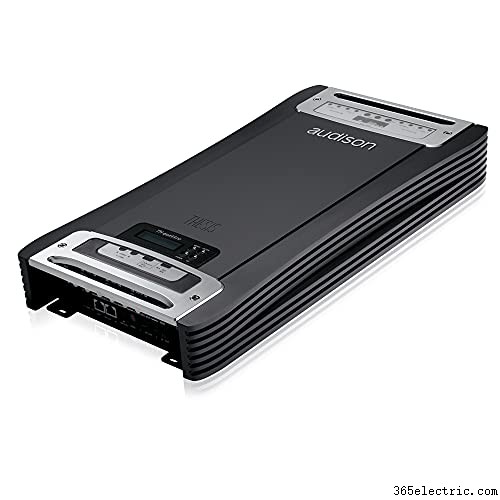
Things to Think About Next
Before deciding on a suitable amplifier, there are a few things to keep in mind:
#1. How big is your car, and how much room is there to fill up with the sound?
#2. What do you want to gain from getting an amplifier?
#3. Will you keep the current audio system or upgrade other electrical components, such as the speakers and subwoofer?
#4. How many speakers do you have or planning to get?
#5. What size amplifier do you need for the setup?
#6. How much do you want to spend?
#sept. Can you install the amp yourself, or should you look into professional installation?
Personally, I found that the factory speakers that came in my vehicles were not adequate for the type of music and the volume levels that I like to listen to.
Upgrading the car speakers and adding an amplifier drastically improved the sound quality, even at high volumes, without changing the factory head unit.
So, if you are anything like me, you will not regret adding an amplifier to your car stereo system, no matter how you do it.
Conclusion
Car amplifiers are a great way to improve your car audio system by providing more power to your speakers, and they come in various sizes and styles to fit any budget.
There are many things to consider before purchasing an amplifier, such as the size of your car, what kind of sound system you have, how much power you need, and what features you are looking for.
Now that you know a little more about car amplifiers, hopefully, you can make a more informed decision on whether or not one is right for you and your car audio system.
